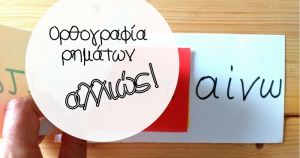Difference between revisions of "Language/Modern-greek-1453/Grammar/Intervention-in-the-spelling-of-Greek-verbs"
< Language | Modern-greek-1453 | Grammar
Jump to navigation
Jump to search
| Line 1: | Line 1: | ||
[[File:orthografia-rhmatwn-alliws-gia-thn-dyslexia.jpg|thumb | [[File:orthografia-rhmatwn-alliws-gia-thn-dyslexia.jpg|thumb]] | ||
== Intervention in the spelling of Greek verbs == | == Intervention in the spelling of Greek verbs == | ||
'''Steps''' | '''Steps''' | ||
Latest revision as of 00:18, 28 September 2023
Intervention in the spelling of Greek verbs[edit | edit source]
Steps
The goal of our intervention is to write correctly spell verbs in –αινω, using the analogy strategy.
This particular strategy will mainly be used in interventions that they will follow.
1) Verbs in «–αίνω»[edit | edit source]
The rule:
Verbs ending in –αίνω are written with – αι –
| ανεβαίνω | ascend |
| κατεβαίνω | descend |
| μπαίνω | enter |
| βγαίνω | go out |
| πηγαίνω | go |
| ακριβαίνω | raise the price |
| βαθαίνω | deepen |
| σκληραίνω | harden |
| θερμαίνω | heat |
| ζεσταίνω | heat up |
| μαθαίνω | learn |
| καταλαβαίνω | understand |
| πετυχαίνω | succeed |
| ομορφαίνω | beautify |
| τρελαίνω | craze |
| σωπαίνω | i keep quiet |
| συμβαίνω | happen |
| ρυπαίνω | pollute |
The verbs are excluded[edit | edit source]
μένω : stay
δένω : tie
πλένω : wash
2) Rule:[edit | edit source]
In the 2nd and 3rd person singular, when before the verb there is the personal pronouns : «εσύ», «αυτός», «αυτή», «αυτό» (you, he , she, this) the ending it is ALWAYS written with «–ει».
| (εσύ) δένεις | (you) tie |
| (αυτός) ντύνει | (he) dresses |
| (αυτό) γράφει | (it) writes |
| (εσύ) αθροίζεις | (you) sum up |
| (αυτή) απαντάει | (she) answers |
| (αυτό) ρωτάει | (it) asks |
| (αυτός) κατοικεί | (he lives |
| (αυτή) δημιουργεί | (she) creates |
3) Rule[edit | edit source]
In the 1st, 2nd and 3rd person plural of the active voice, when before the verb there is the personal pronouns : «εμείς», «εσείς», «αυτοί, αυτές, αυτά» (we, you, these, they,that's all ) the ending «ε» is ALWAYS written «ε»
| (εμείς) ντύνουμε | (we) dress |
| (εσείς) γράφετε | (you) write |
| (αυτοί-αυτές-αυτά) ακούνε | (they-they-they) listen |
| (εμείς) κατοικούμε | (we) reside |
| (εσείς) απαντάτε | (you) answer |
| (αυτοί-αυτές-αυτά) ρωτάνε | (they-they-they) ask |
Author[edit source]
- Ευγενική χορηγία που στοχεύει να βοηθήσει μαθητές ή μη, απανταχού της Γης, που επιδίδονται στην εκμάθηση της ελληνικής γλώσσας!
- Contribution bénévole visant à aider les personnes, partout dans le monde, qui sont engagées dans l'apprentissage de la langue grecque !
- Voluntary contribution aimed at helping people, all over the world, who are committed to learning the Greek language!
